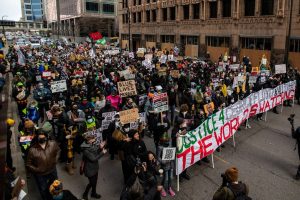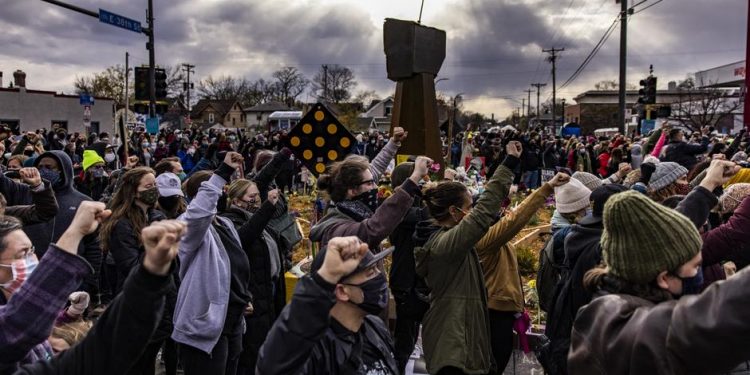Simon Rodriguez (IWU-FI)
On April 20, former police officer Derek Chauvin was convicted of the murder of George Floyd. A jury found him guilty on all three counts: second-degree and third-degree murder, as well as second-degree manslaughter. The reading of the sentence and an expressionless Chauvin led out of the courtroom handcuffed by sheriff’s deputies were televised.

It was undoubtedly a triumph of the anti-racist rebellion of the summer of last year, during which over 20 million people took to the streets, in gigantic marches in hundreds of cities in every state in the country, overcoming police and National Guard repression, setting police premises on fire and tearing down racist statues and monuments.
The sentence, to be handed down by a judge in the coming weeks, is expected to be over ten years in prison. The ruling was celebrated by the youth and the communities, who realized that their mobilization could to break through the practices of institutions that are racist to the core. It was a historic milestone. According to the American Civil Liberties Union, it is the first time in Minnesota state history that a white police officer has been convicted of murdering a black man in his custody.
Just over 1 per cent of police brutality complaints result in some type of sanction in that state. Police use violent methods 7 times more often against blacks than whites in the state capital, Minneapolis. But in the rest of the country things are not much different. Between 2005 and 2017, police killed about a thousand people per year in the US. In that entire period, only 29 police officers were convicted of murder or manslaughter (BBC, April 15 2021).
Mobilization defeated impunity
The first police report on the events of May 25 was an attempt to cover up Floyd’s murder. According to this document, the arrest had been carried out without incident, but when the police noticed that the “suspect” appeared to be “suffering medical distress”, they requested medical assistance, which did not prevent him from dying later in a medical center.
But the murder of Floyd, who was accused of having bought cigarettes with a counterfeit $20 bill, was videotaped by several people, including a teenage girl, and the crime was exposed to the eyes of the world. For nine minutes Floyd was choked by Chauvin, with the help of three other police officers, whose trial will take place in the coming months. Initial statements by local prosecutors showed that no police officer would be prosecuted. But the mass protests changed everything. In the end, the police decided to try to clean up their image by testifying against Chauvin and accusing him of violating established procedures, something very rarely seen in court given the police’s corporate complicity and racist ideology.

Relief and nervousness among capitalists
President Biden was “relieved” by the conviction, reflecting the most widespread reaction among the capitalists, fearful of a new outburst of popular anger if the racist Chauvin was acquitted. For the liberal political current of the imperialist bourgeoisie which he represents, the most important objective is to rebuild confidence in the repressive and judicial institutions, demonstrating that the judicial system “works”. With sly cynicism, Biden even intends to name a police reform bill after Floyd. During last year’s anti-racist protests, Biden’s recommendation to the police was not to shoot to kill but to “shoot at the legs.”
As part of the effort to clean the face of the regime, Attorney General Merrick B. Garland announced a day after the Chauvin sentencing that a new Justice Department investigation will be opened, in addition to the federal investigation into Floyd’s murder, to determine whether the Minneapolis Police Department engages in unconstitutional or illegal practices, if there are patterns of repressive brutality or discrimination. Normally this type of investigation results in reform negotiations, so its meaning is more political than strictly judicial. Hence Garland insists on the liberal refrain that most police officers act “honorably” and are in favor of reform.
But other sectors cannot hide their resentment at the resounding triumph of the anti-racist struggle. The Wall Street Journal editorial on April 20 lamented that Chauvin’s conviction will not be seen as a demonstration that the system works, but as a triumph of “illegal” protests. This conservative sector understands that the lesson that millions have drawn from this experience is not the most convenient for the bourgeoisie.
While talking about reforms and overcoming racism, the regime continues to tighten its screws with the recent approval of 29 repressive state laws attacking the right to protest. The number of new anti-democratic laws could rise to a hundred if the pending bills are approved. The law, for example, passed in Florida the day before the Chauvin ruling, allows for the criminalization of people who take part in protests that turn violent, without the person incriminated having committed any violent act.
Pending tasks
Thousands of racist murders as brutal as the one perpetrated against George Floyd remain unpunished, even if not all have been recorded on video. The struggle to put racist and murderous police officers in jail continues, strengthened by the conviction of Chauvin. Nor should it be forgotten that during the 2020 anti-racist protests there were thousands of arrests, after which hundreds of people have been criminalized and many remain behind bars. It is important to continue to fight for a general amnesty for all anti-racist fighters. The demand for drastic cuts in police budgets to reinvest the money in necessary social assistance in the context of the economic crisis is still valid.
Illusions that Chauvin’s conviction marks a turnaround, nurtured by Biden, his Democratic Party administration and other establishment politicians, have no basis in reality. Racist police brutality has not stopped. Near the courthouse where Chauvin was convicted, just a month earlier, Duarte Wright, a 20-year-old African-American man arrested for allegedly having an expired license plate, was murdered. Almost simultaneously with the reading of the verdict against Chauvin, in Columbus, Ohio, police officers shot and killed Ma’hkia Bryant, a black teenager who had called the police to intervene in the middle of an altercation. After the murder, a police officer shouted “Blue Lives Matter”, a slogan used by the extreme right to vindicate racist police brutality.
There are around 800,000 police officers in the U.S., a veritable army whose enemy is the poor and working people, whom the capitalists need to keep at bay in amidst abysmal social inequality, deprived of social rights such as access to free public health care; with miserable wages and precarious labor regimes. The most oppressed and exploited sectors of the working class are African Americans, immigrants and indigenous people, against whom the organized violence of the capitalist state rages, whether under Democratic or Republican governments.
No police reform can aim to change this function of the capitalist repressive apparatus. This fuels the youth’s legitimate hatred of the police and the desire to eliminate it that underlies the abolition slogans. But the capitalist and imperialist Biden administration, no matter how much pressure is exerted on it, will not carry out a reform that would change the social function of the police, much less abolish it and give up a fundamental tool for keeping the mechanisms of exploitation in operation. In Minneapolis, in the heat of the protests, the city council declared it would eliminate the police and replace it with a community force. As soon as the correlation of forces in the streets changed, the project was abandoned.
The anti-racist rebellion won Chauvin’s conviction. It was a decisive factor in Trump’s political and electoral defeat. It has been a source of inspiration for activists from all over the world. Its fruits have not yet been fully harvested and many battles lie ahead. The destruction of the police is a revolutionary task that can only be carried out by workers, youth and oppressed communities if they can build their own political organizations and defend themselves from the violence of the capitalists and their governments, ultimately establishing workers’ and people’s power. Only then will we be able to say that justice has been served to the victims of this system of oppression and exploitation.













